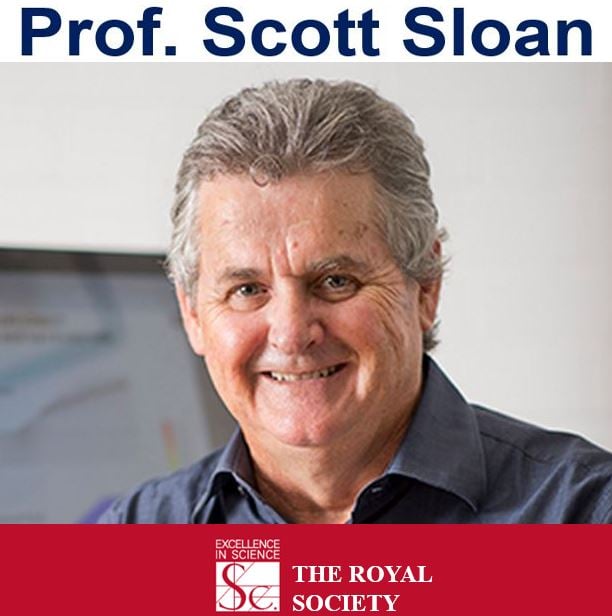Laureate Professor Scott Sloan has been elected to the fellowship of the most eminent scientific minds in the world – The Royal Society. The oldest scientific academy on Earth has included such luminaries as Albert Einstein, Sir Isaac Newton, Charles Darwin, Kathleen Lonsdale, Benjamin Franklin, Charles Babbage, Sigmund Freud, Marjory Stephenson and Stephen Hawking.
Professor Sloan, who joins distinguished company including 80 Nobel Laureates among the Royal Society’s 1,600 fellows, said:
“I’m thrilled at the news. It’s not that common for engineers to be elected as Fellows of the Royal Society.”

Prof. Scott Sloan joins the prestigious fellowship, founded in November 1660. It was granted a Royal Charter by King Charles II as ‘The Royal Society’. (Image: Adapted from The Royal Society)
The Royal Society said in a statement:
“Professor Sloan is distinguished for the development of pioneering new methods which can be used to predict the ultimate limit states of geostructures such as tunnels, dams, highways and foundations. Being able to estimate the limit load accurately is complicated by the fact that the behaviour of geomaterials is dilatant, nonlinear, heterogeneous, anisotropic and dependent on the pore pressures and ground water conditions.”
“His work is based on the limit theorems of plasticity, applied via novel finite element techniques. His research has made fundamental contributions to the science of geomechanics, enabling engineers to model complex geomaterial behaviour in a robust manner, leading to cheaper and safer civil infrastructure worldwide.”
Prof. Sloan thanks University team
Prof. Sloan said his election is a reflection of the enormous work achieved by the University of Newcastle (Australia) team over the past three decades. “The geotechnical team at Newcastle is a world-leader in its field and is home to a number of outstanding researchers of all ages,” he added.
Professor Sloan studied at Monash University in Melbourne where he completed his BEng (Civil, Hons I) and MEngSci degrees. He then won a scholarship from Trinity College to undertake a doctorate at the University of Cambridge in 1978.
Later, he won a Rouse Ball Scholarship at Trinity College, which he held for 12 months. Following three years as a W W Spooner Fellow at New College Oxford, he took up a lectureship in 1984 in Civil Engineering at the University of Newcastle in Callaghan, New South Wales.
In 2007, Professor Sloan became head of the University of Newcastle Priority Research Centre for Geotechnical and Materials Modelling. He was made a Laureate Professor in 2008.
Professor Sloan is also the founding Director of the Australian Research Council (ARC) Centre of Excellence for Geotechnical Science and Engineering.
A prolific career
He has published over 340 peer reviewed papers and delivered more than 40 plenary, keynote and invited papers at conferences. “He accumulates in excess of 600 Scopus citations per year which places him amongst the elite of geotechnical innovators and at the forefront of research in geomechanics,” the University of Newcastle wrote.
Sir Paul Nurse, President of the Royal Society, said that science and its application were key to so many aspects of our lives today “From treating infectious diseases, to building safe bridges and tunnels, searching out life on other planets and even vacuuming our living rooms, science helps us understand ourselves better and it makes our lives better.”
Regarding the support from the University of Newcastle, Prof. Sloan said:
“The continued support of the University will be central to our success in the future, as the international competition for research talent in my field is intense.”
Video – Founding the Royal Society

